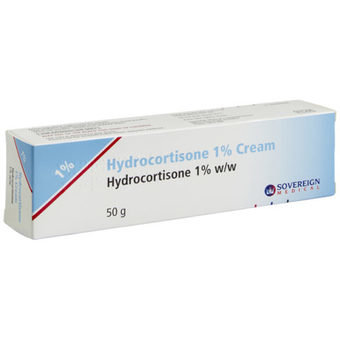Medication features
Hydrocortisone Cream & Ointment is a prescription medicine that contains Hydrocortisone 0.1%. Hydrocortisone is a corticosteroid that is applied topically to relieve skin inflammation and itching associated with severe forms of inflammatory skin conditions such as Eczema, Psoriasis and Dermatitis.
- Steroid medication to reduce inflammation
- Treats eczema and psoriasis
- Soothes itching
- Genuine medication
- Sourced in the UK
Overview
What Is Hydrocortisone?
Hydrocortisone cream is a topical treatment for alleviating various skin condition symptoms such as inflammation, redness and itching. It is also available under brand names such as Derma Care, Dermacort, Dioderm, HC45, Lanacort, Mildison Lipocream, Pinewood’s and Zenoxone.
The active ingredient of hydrocortisone 1% cream is hydrocortisone. Each gram of hydrocortisone cream contains 10 milligrams of hydrocortisone, as well as inactive ingredients including Benzoic acid, chlorphenesin, citric acid, glycerin, glyceryl monostearate, methylparaben, mineral oil, petrolatum, phenoxyethanol, polysorbate 80, purified water, titanium dioxide and trisodium citrate.
Hydrocortisone cream can relieve inflammation and itchiness for up to 12 hours and is simple to apply, being rubbed gently onto the affected area of the skin.
What Is Hydrocortisone Cream Used For?
Hydrocortisone cream is used to treat skin conditions such as dermatitis, eczema and psoriasis, as well as insect stings and bites, prickly heat rash (caused by sweat becoming trapped in the skin), and nappy rash. It is a topical corticosteroid treatment that reduces the symptoms - such as inflammation, redness and itching - of these skin conditions. When flare-ups occur, hydrocortisone cream is applied twice per day to relieve symptoms.
The majority of adults and children over the age of 10 can use hydrocortisone cream. You may not be suitable for hydrocortisone cream if you:
- Are under the age of 10
- Have a skin infection
- Have an eye infection
- Have had an allergic reaction to hydrocortisone or another medicine in the past
How Does Hydrocortisone Work?
Hydrocortisone is a mild corticosteroid (steroid) which can control symptoms of eczema, as well as other conditions such as psoriasis and dermatitis. Steroids are produced naturally by the body’s adrenal glands. Man-made corticosteroid treatments such as hydrocortisone cream are effective in reducing inflammation; both in the skin and other areas of the body.
The skin becomes inflamed due to irritation or an allergic reaction. This causes the skin to release chemicals that widen your blood vessels and make the skin irritated, swollen, red, painful and itchy. Hydrocortisone works on skin cells to stop the chemicals that cause inflammation from being released, reducing symptoms such as itching, redness and pain.
Can I Use Hydrocortisone Cream While Pregnant?
Milder hydrocortisone creams such as hydrocortisone 1% cream can be used during pregnancy. Stronger types of hydrocortisone treatment such as hydrocortisone butyrate are not usually recommended for pregnant women.
Hydrocortisone cream can be used when you are breastfeeding. As a precaution, you should wash off cream on, or near, your breasts, before breastfeeding your baby. A stronger hydrocortisone treatment such as hydrocortisone butyrate would not normally be recommended for breastfeeding women unless prescribed by a dermatologist (skin specialist).
Always contact your doctor before using a new medication, especially when you are pregnant.
Clobetasone Butyrate vs Hydrocortisone
Like hydrocortisone, clobetasone butyrate is a topical corticosteroid that is used to treat skin problems such as eczema, psoriasis and dermatitis, relieving symptoms such as swelling, irritation and itching. The two creams contain different active ingredients - clobetasone butyrate contains clobetasone butyrate, rather than hydrocortisone.
Clobetasone butyrate is stronger than hydrocortisone and comes as a 0.05 % cream. It has been shown in a study to be more effective than hydrocortisone in treating eczema, although there is “no clinically significant difference” in short-term use.
Betamethasone vs Hydrocortisone
For treating skin conditions such as eczema and psoriasis, medium-strength Betamethasone is stronger than hydrocortisone skin cream.
Betamethasone contains a different active ingredient from hydrocortisone - betamethasone valerate – and unlike hydrocortisone 1% cream, is only available on prescription.
Hydrocortisone Reviews
Eczema sufferers have praised hydrocortisone cream online for its ability to control their symptoms when flare-ups occur. Some users observed that hydrocortisone cream was more effective in treating their eczema than natural remedies. Reviewers online were satisfied that hydrocortisone cream was effective in clearing up their rashes and inflamed, red and bumpy skin during eczema episodes. Several reviews report that hydrocortisone cream was effective in clearing up their eczema symptoms in less than a week.
Aside from eczema, hydrocortisone cream has also been reviewed as effective in treating other skin conditions such as dermatitis, psoriasis, itches and rashes. Side effects reported include a mild stinging or burning after application, and skin atrophy (the thinning of the skin) when used over a long period.
Can You Buy Hydrocortisone Cream Over the Counter?
Hydrocortisone cream is only available on prescription and can only be purchased from a pharmacy in the UK once you have undergone a consultation.
For your convenience, you may wish to purchase hydrocortisone cream online. Using Cloud Pharmacy’s online service, you can buy hydrocortisone cream conveniently online following a consultation with one of our online pharmacists. Once approved, you will be provided with an electronic prescription and your hydrocortisone cream can be dispensed. We will then send your cream in a discreet package via next-day delivery.
Directions
Hydrocortisone Dosage
Hydrocortisone cream is applied once or twice per day. If you are using hydrocortisone cream twice per day, you should leave a gap of at least eight hours before you use the treatment. Hydrocortisone cream should be used less often when skin condition symptoms start to improve. You shouldn’t use hydrocortisone cream for more than ten days in a row.
If you miss a dose of hydrocortisone cream, apply the cream as soon as you remember, unless it’s just a few hours until your next dose, in which case wait for your next dose. Don’t apply a double dose in order to make up for the missed dose.
How Long Does It Take for Hydrocortisone to Work?
After starting to use hydrocortisone cream, your skin should get better within a few days. If you still have symptoms after seven days, or your skin worsens, inform your doctor.
How long you will use hydrocortisone cream depends on your reason for using it. If you have a long-term skin problem like eczema or psoriasis, you will use hydrocortisone cream as and when required; when flare-ups occur. For insect stings and bites, contact dermatitis (a type of eczema that is caused by a reaction or contact with a particular substance) and nappy rash, hydrocortisone cream is used for up to a week. If you have a chronic skin condition, your doctor may advise using hydrocortisone cream for a maximum of a few weeks in order to lower your risk of side effects such as skin atrophy.
How to Apply Hydrocortisone Cream
Hydrocortisone cream is used once or twice per day to treat skin problems such as eczema, psoriasis, dermatitis, insect stings and bites, prickly heat rash and nappy rash.
After washing and drying your hands, squeeze out a fingertip unit of cream before spreading it in a thin layer over the affected area of the skin. Rub it gently into your skin. If there is hair on the affected skin, rub the cream in the same direction your hair grows. The cream should be applied to all irritated skin areas, not just the worst-affected areas. You should try to avoid any cuts or broken skin. After you’ve applied the cream, wash your hands, unless you are treating the skin on the hands.
The face is a sensitive area. You should only use hydrocortisone cream on your face if advised to do so by a doctor.
Side Effects
Hydrocortisone Cream Side Effects
Mild hydrocortisone treatments such as hydrocortisone 1% cream are considered very safe. You are unlikely to experience side effects when using the treatment for less than four weeks.
Among the most common potential side effects of hydrocortisone cream are stinging or burning after application. This is typically nothing serious and usually subsides after a few days of use.
Potential side effects caused by prolonged use include:
- Skin atrophy (your skin becoming thinner)
- Stretchmarks
Serious side effects from mild hydrocortisone treatments are rare. If you experience any of the following after taking hydrocortisone cream, such as:
- Swollen or red skin
- Discharge from your skin
- An upset stomach
- Confusion
- Being more hungry or thirsty than normal
- Breathing faster than normal
- A puffy face
- Depression
- Muscle pain
- Muscle weakness
Contact a medical professional or call 999.
Patient Information Leaflet
Hydrocortisone Cream Patient Information Leaflet
For more information on hydrocortisone cream, take a look at the patient information leaflet below:
Related Guides
Delve into a variety of content written by our medical experts
Hydrocortisone 1% Cream & Ointment Reviews
Confirm Hydrocortisone 1% Cream & Ointment treatment selection
| Cream | 30g | £9.99 |
| Cream | 50g | £13.99 |
| Cream | 2 x 50g | £21.98 |
| Ointment | 30g | £9.99 |
| Ointment | 50g | £13.99 |
| Ointment | 2 x 50g | £21.98 |
















